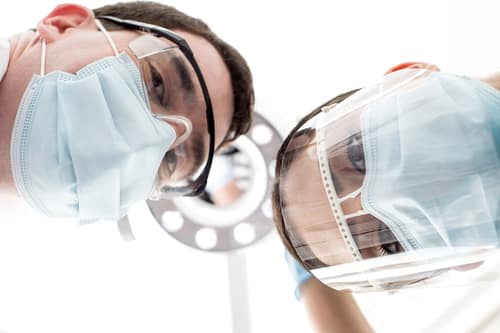There are a host of questions you should ask when choosing a dental surgeon, but some are more vital than others. Choosing a competent dental surgeon is a critical task, since oral surgery may affect your overall quality of life, not only your smile and teeth.
You may trust your dentist completely, but he/she may not be qualified or experienced with oral surgery. Often, people develop confidence and trust in their dentist, whom you visit at least every six months for cleaning and examination. However, hopefully you are not on a “first name basis” with a maxillofacial surgeon.
While you may simply accept your dentist’s referral of an outstanding oral surgeon, should you need one, you should ask these vital questions of your trusted dentist first. Your dentist should have satisfactory answers, if he/she is referring a dental surgeon to you.
Dental surgeons perform a wide array of procedures. From relatively simple tooth extractions to partial or full facial reconstruction procedures, competent oral surgeons in the US and Australia are multi-talented medical professionals. You still want to be comfortable with your choice of dental surgeons. You will establish a comfort zone if you ask some pertinent questions and receive equally valuable answers.
Vital Questions to Ask
Are the professionals you’re considering experienced and board certified oral and maxillofacial surgeons?
Don’t be fooled by believing this is an obvious “throw away question.” Some dentists in the US and Australia may tout that they perform oral surgery, when they may not have the training or experience you deserve.In the US the American Board of Oral and Maxillofacial surgery publishes criteria for competence and board certification as an oral surgeon. The Dental Board of Australia publishes the standards for 13 dental specialties, including oral surgery, for registration as a specialist.You should evaluate those dental professionals that have earned certification or registration as oral surgeons. This will give you comfort and confidence that those dental providers on your consideration list have the training and experience you want.
Are the oral surgeons you’re considering trained and/or board certified in dental anesthesiology?
Many surgical procedures, including challenging tooth extractions, require general anesthesia to offer the best patient experience. You should know the training and experience level of the maxillofacial surgeons you are considering. Board certification is the easiest way to determine if those you are considering are trained in the safe administration of general anesthesia.
Do the oral surgeons you’re considering have local hospital privileges?
While many surgical procedures, such as tooth extractions, can be performed safely in the surgeon’s office, there are times when hospital facilities are better equipped for more complex procedures. For example, some patients have cardiac issues that place them at risk when general anesthesia or complications arise that recommend performing the maxillofacial surgery in a hospital facility.
Does the dental surgeon or his/her office provide effective infection control methods and what is their infection rate?
When hospitalization is not necessary, does the surgeon’s office employ infection control equal to that of an outstanding hospital? Oral surgeons should track their personal record of post-operative infections to compute a rate. You should ask if the practice keeps track of these infections, while understanding there are no experienced oral surgeons that have never had a patient without post-operative infection regardless of the preventative controls the dentist provides.Often, some patients are simply prone to post-surgical infections. However, the surgeon should have evidence of the infection prevention controls the office follows. These controls should include those best-practices the best hospitals use to minimize patient infections, such as painful “dry sockets” after tooth extractions.
Does the oral surgeon participate in the patient’s total care, before and after the procedure? Or do they “hand off” the patient back to the referring dentist, who is qualified to offer professional patient care?
Many specialists are “technicians,” realizing there are limited opportunities to create strong bonds with their patients. Since some patients will only need their services once, these oral surgeons focus on fixing the problem, not providing total care. They let their staff offer care and advice, or simply refer patients back to their dentists to provide care after procedures.Often, their patients are happy their oral surgeon pursues the “hand off” approach, since they often prefer their regular dentist to care for them, rather than an oral surgeon they barely know. Alternatively, some specialists also have a thriving preventative dentistry practice and prefer to offer post-surgical care.
These questions should form the foundation of all your queries and concerns when you choose a dental surgeon for necessary procedures. There are probably many additional questions you can ask, but make sure you include these in your checklist.

